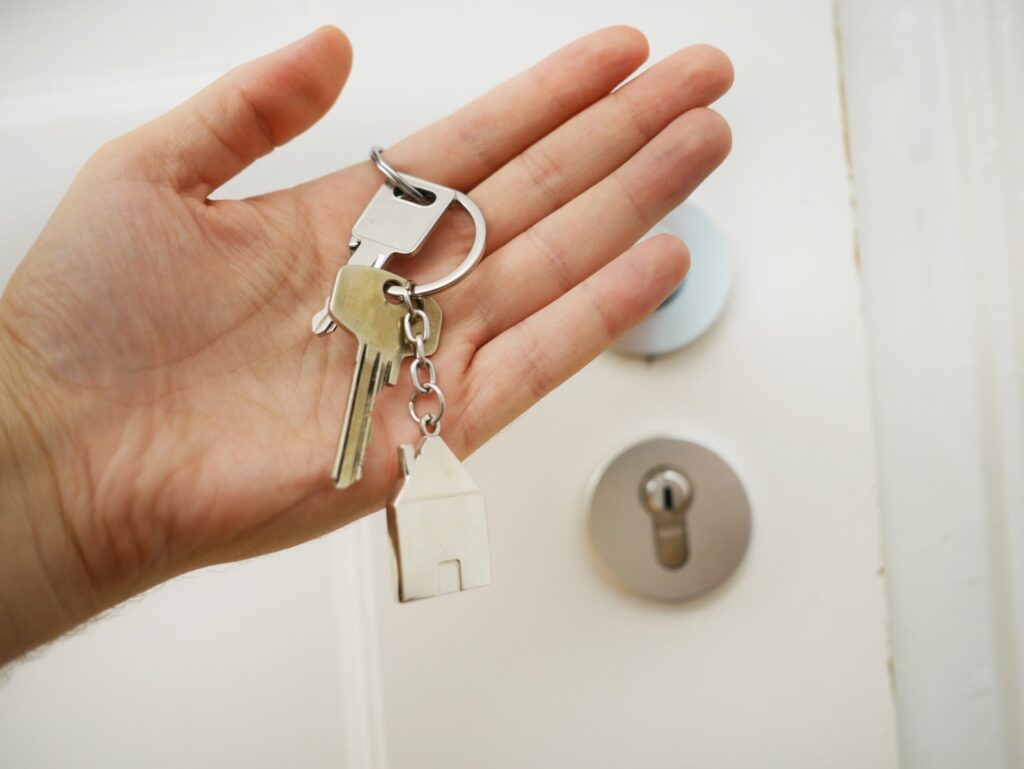Going through an apartment jungle in Germany is an inevitable thing for every person recently relocated or planning to move. We always have an ideal image of our dream flat – cheap rent, central location, cool housemates (if any), all conveniences and an unbeatable view. But how to get a strike if your deadlines are strict, German proficiency is poor and the stress of relocation still makes your knees weak? Right, get prepared and make notes of the tips on how to rent an apartment in Germany.
Learn to properly read housing ads
It would be a mistake to think that just navigating through housing ads and creating tabs is the first and the easiest part of flat hunting. It’s important to properly read various abbreviations and acronyms you might see while browsing housing ads. We put together all of them in one mini rental glossary:
- QM – Quadratmeter – square meter or M2. This is a space measurement unit, in ads, it’s always accompanied by a number – 95QM, for example, means that the total area of the flat is 95 square meters. Not a bad-sized home?
- BJ – Baujahr – a year in which the house was built. The exact year is usually following BJ acronym – BJ 14 means that the house was built in 2014;
- Zi. Whg – Zimmer Wohnung – is accompanied by a number and tells you how many rooms are in the flat. 3 Zi. Whg is a three-room apartment. Note: three-room apartment means that there are literally three rooms and not three bedrooms;
- EG, OG, DG – Erdgeschoss, Obergeschoss, Dachgeschoss – stand for “ground floor,” “upper floor,” and “attic floor” respectively;
- NK or BK – Nebenkosten or Betriebskosten – extra costs for heating, water, insurances, etc;
- KT or K – Kaution – indicates that you will also need to pay a security deposit apart from the first rent. You can get it back when moving out;
- EBK – Einbauküche – already built-in kitchen. In English, there’s a special abbreviation for flats without it – Bring Your Own Kitchen (BYOK);
- WG – Wohngemeinschaft – means that you will have flatmates, i.e. it’s a shared flat;
- ZH – Zentralheizung – central heating;
- NMM – Nettomonatsmiete – net monthly rent, i.e. plus costs for heating, electricity, gas, water, waste disposal.
And some keywords you might find on German bulletin boards:
- Mieten – to rent;
- Mietvertrag – lease;
- Immobilienhändler – a real estate agent;
- Mitbewohner – flatmates;
- Schlafzimmer, Badezimmer, Wohnzimmer —bedroom, bathroom, living room.
And now, if you come across a thing like “80QM BJ 18 2 Zi.Whg EBK KT” you will not be ambushed and could determine that it’s a two-room flat of 80 square meters in a house built in 2018 with built-in kitchen and a need to pay a security deposit before moving.
Make time for search
Germany is one of the most attractive destinations for migrants from all over the world. All these people need somewhere to live and, consequently, put further pressure on the country’s housing market.
The same picture is when it comes to locals, as Germany is the country of renters. In 2018, only about 42% of German citizens owned the home they lived in. This means that you will likely have to look through thousands of housing advertisements, respond to hundreds, have lots of viewings and interviews with landlords before you find the only right flat. It’s important to be prepared for this long and sometimes not so easy search.
The main advice here – do not postpone looking for a flat in Germany, start the search before you actually moved. This will help you to dive into the local housing market, figure out its key rules and determine own preferences.
Also, keep in mind that the level of rental competitiveness also depends on the location of the apartment. The situation on the market in the biggest cities, like Berlin, Dusseldorf, Frankfurt am Main, Hamburg, Cologne, and Munich is quite tense.
Call instead of sending emails
While hunting for an apartment in Germany it’s important to act fast. If you hesitate to call directly to landlords and write long and polite emails instead – other possible tenants could succeed before you and steal your dream flat. Your letter or filled online form could also be overlooked, while a direct call increases your chances for success!
While hunting for an apartment in Germany it’s important to act fast.
For cases when texting is the preferred way of communication or there is no phone number – create a default message to use it for different advertisements with little changes. It’s important to introduce yourself at the beginning of the letter – indicate your name, age, occupation, monthly income, for how long you live in Germany and what are your requests regarding the apartments. The more information you provide – the more likely a landlord will respond to you.
Make price research
It’s difficult to determine an average price for a square meter of a flat for rent in Germany, as it depends on five key factors:
- City. If you want to rent apartments in the center of Munich, which if the most expensive German city in general, you will certainly have to put more money on the table. The price varies depending on a city, as each of them has different migrant pressure and level of economic and business development;
- Location. There is a stereotype that a centrally-located apartment is the only convenient variant for newcomers, as it would be closer to all important places in the city. It’s true, but a transport system in the country is really well-developed, so it makes sense to also consider options in calm suburbs;
- Size of apartments. Think in advance how much housing space you will need depending on whether you’re moving alone or with family and some other specific circumstances. The bigger flat the bigger price – an iron rule;
- Furniture. Keep in mind that often flats offered for rent in Germany are poorly furnished or not furnished at all. And you will need to budget things needed for a comfortable living. If apartments are absolutely ready for a new tenant, the price would be higher, but this option could prevent you from having undue fussing while moving. The same applies to the above-mentioned EBK (do you remember what does it mean from point 1? Right, built-in kitchen). Sometimes it’s possible to buy it from a previous tenant, otherwise, be prepared to install your own.
- Warm rent vs Cold rent. A flat’s price could either be “warm” (Warmmiete) or “cold” (Kaltmiete). The key difference here lies in Nebenkosten or additional costs (service charges). Kalmiete is the price you pay for space itself, it does not include, for example, the price for electricity, water supply or heating. Warmmiete is the Kaltmiete plus Nebenkosten. Nebenkosten substantially varies, as some landlords pay for such services as garden maintenance or garbage collection on their own, while others require a tenant to cover such costs. Make clear this important aspect to administer your funds.
One more tip concerning the price – to make a whole picture clearer use the so-called rental mirror or the Mietspiegel. This is a guide, prepared by the German government, which reflects indices of local rents, prices per square meter depending on the area and condition of a building. It will help you to rank possible flat options depending on your personal requests and budget.
Whether a real estate agent is needed?
Hiring a real estate agent (Makler), who will take care of everything, will make your flat hunting easier. This is the best option for those who have limited time to rent an apartment in Germany and pending deadlines.
To start working with Makler, you will first need to sign an agreement, which often provides that all issues concerning apartments should be solved with the mediation of your agent and not directly with the landlord. Note that a Provision, or agent fee, cannot be higher than the two months’ cold rent plus 19% of value-added tax (VAT).
Don’t forget about paperwork
Germans are masters of bureaucracy. So, you should become a master in filling different forms and correctly writing all types of applications before renting an apartment in Germany.
When it comes to renting, it’s not enough just to choose a suitable option and make preliminary arrangements with a landlord. You need to prove that you’re solvent enough to rent flat and will not suddenly disappear at the end of the first month of the lease. So, below is the list papers you will need to officially move in:
- A copy of your ID or passport. This is the only way a landlord can identify you;
- Confirmation that you have no rental debts. In German, this paper called by a simple word Mietschuldenfreiheitsbescheinigung 🙂 It proves that you have no debts to your previous landlords (if there were any) and assures that you are trustworthy in terms of monthly payments. The easiest way to get Mietschuldenfreiheitsbescheinigung is to reach out to your previous landlord for written confirmation. If you rent a flat in Germany for the first time, better to provide more proof in other areas: financial statements, for example. It’s up to a landlord to decide whether to accept an application without confirmation of having no rental debts or not. It’s often the case that people rent temporary accommodation to settle all the relocation issues, including to find permanent housing. So, the confirmation from a previous temporary landlord could be easily obtained for a new one;
- Salary confirmation. Landlords usually ask for the last three salary slips. In case you don’t have any payslips, you can present your bank account statements indicating that you have enough money to cover the rent;
- Tenant application form or Mieterselbstauskunft. This paper is filled by a tenant to provide the landlord with some basic information – date of birth, nationality, age, amount of people who are going to live in apartments, income, etc;
- SCHUFA or proof of your creditworthiness. Germany’s SCHUFA Holding is responsible for keeping a record of your debts in Germany, while the same-title paper is an assessment of your credit score by a specialized agency. Note that if you have never lived in Germany before, your SCHUFA in this country will be blank. Otherwise, you can order it at the organization directly and pay for this about 30 euros.
Deal with deposit
Prepare to pay a security deposit (Kaution) before moving to a new flat. Its amount can be no more than three months of Kaltmiete. You will get it back when your rental period ends. A landlord has also right to retain a certain amount of money from the Kaution if any damage was caused to a flat during the lease.
Note: landlords have the right to hold a deposit or part of it for up to 6 months, which means that you will unlikely to get back the whole deposit once moving out of the apartments.
Time to Party!
Once all issues are settled and you have officially moved in – throw a housewarming party! It’s a good way to meet your new neighbors, break the ice and fit in the community of people living close to you!

Planning to move to Germany? Check our Relocation Guide, it is free for downloading and no need to leave any personal information.



